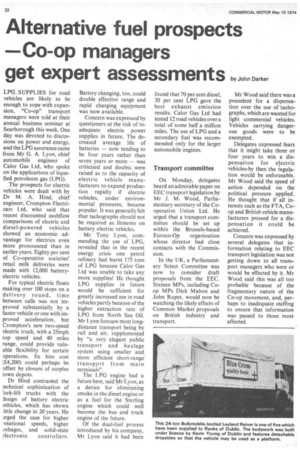Alternative fuel prospects —Co-op managers
Page 24

If you've noticed an error in this article please click here to report it so we can fix it.
get expert assessments by John Darker LPG. SUPPLIES for road vehicles are likely to be enough to cope with expansion, "Co-op" transport managers were told at their annual business seminar at Scarborough this week. One day was devoted to discussions on power and energy, and the LPG assurance came from Mr G. A. Lyon, chief automobile engineer of Calor Gas Ltd, who spoke on the applications of liquefied petroleum gas (LPG).
The prospects for electric vehicles were dealt with by Dr M. A. Hind, chief engineer, Crompton Electricars Ltd, who said that recent discounted cashflow comparisons of electric and diesel-powered vehicles showed an economic advantage for elect rics even more pronounced than in earlier years. Eighty per cent of Co-operative societies' retail milk deliveries were made with 12,000 batteryelectric vehicles.
For typical electric floats making over 100 stops on a delivery round, time between calls was not improved substantially by a faster vehicle or one with improved acceleration, but Crompton's new two-speed electric truck, with a 25mph top speed and 40 miles range, could provide valuable flexibility for certain operations. Its hire cost ;£4,200) could perhaps be offset by closure of surplus town depots.
Dr Hind contrasted the technical sophistication of t'ork-lift trucks with the iesign of battery electric vehicles, which has shown ittle change in 20 years. He arged the case for higher -otational speeds, higher voltages, and solid-state Jectronic controllers. Battery changing, too, could double effective range and rapid charging equipment was now available.
Concern was expressed by questioners at the risk of in adequate electric power supplies in future. The decreased average life of batteries — now tending to be four years rather than seven years or more — was criticized and doubts were raised as to the capacity of electric vehicle manu facturers to expand produc tion rapidly if electric vehicles, under environ mental pressures, became popular. It was generally felt that tachographs should not be required as fitments on battery electric vehicles.
Mr Tony Lyon, commending the use of LPG, revealed that in the recent energy crisis one petrol refinery had burnt 175 tons of LPG because Calor Gas Ltd was unable to take any more supplies! He thought LPG supplies in future would be sufficient for greatly increased use in road vehicles partly because of the higher extraction rate of LPG from North Sea Oil.
Mr Lyon foresaw most long distance transport being by rail and air, supplemented by "a very elegant public transport and haulage system using smaller and more efficient short-range' transp.ort from main terminals".
The LPG engine had a future here, said Mr-Lyon, as a device for eliminating smoke in the diesel engine or as a fuel for the Sterling engine which could well become the bus and truck engine of the future.
Of the dual-fuel process introduced by his company, Mr Lyon said it had been found that 70 per cent diesel, 30 per cent LPG gave the best exhaust emission results. Calor Gas Ltd had tested 12 road vehicles over a total of some half a million miles. The use of LPG and a secondary fuel was recommended only for the larger automobile engines.
Transport committee
On Monday, delegates heard an admirable paper on EEC transport legislation by Mr J. M. Wood, Parliamentary secretary of the Cooperative Union Ltd. He urged that a transport committee should be set up within the Brussels-based Euroco-Op organization whose director had close contacts with the Commission.
In the UK, a Parliamentary Select Committee was now to consider draft proposals from the EEC. Sixteen MPs, including Coop MPs Dick Mabon and John Roper, would now be. watching the likely effects of Common Market proposals on British industry and transport. Mr Wood said there was a precedent for a dispensation over the use of tachographs, which are wanted for: light commercial vehicles. Vehicles carrying dangerous goods were to be exempted.
Delegates expressed fears that it might take three or four years to win a dispensation for electric vehicles-by then the regulation would be enforceable. Mr Wood said the speed of action depended on the political pressure applied. He thought that if all interests such as the FTA, Coop and British vehicle manufacturers pressed for a dispensation it could be achieved.
Concern was expressed by several delegates that information relating to EEC transport legislation was not getting down to all transport managers who were or would be effected by it. Mr Wood said this was all too probable because of the fragmentary nature of the Co-op movement, and, perhaps to inadequate staffing to ensure that information was passed to those most affected.












































































































































































